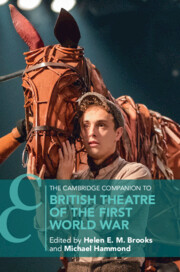Book contents
- The Cambridge Companion to British Theatre of the First World War
- Cambridge Companions to Theatre and Performance
- The Cambridge Companion to British Theatre of the First World War
- Copyright page
- Contents
- Figures
- Notes on Contributors
- Chronology of Events and Productions
- Introduction
- Part I Mobilising for War
- Part II Theatre during the War
- Part III The Memory of War
- Chapter 12 Reflecting on the War
- Chapter 13 Re-imagining the War
- Chapter 14 Commemorating the War
- Further Reading
- Index
Chapter 12 - Reflecting on the War
from Part III - The Memory of War
Published online by Cambridge University Press: 19 October 2023
- The Cambridge Companion to British Theatre of the First World War
- Cambridge Companions to Theatre and Performance
- The Cambridge Companion to British Theatre of the First World War
- Copyright page
- Contents
- Figures
- Notes on Contributors
- Chronology of Events and Productions
- Introduction
- Part I Mobilising for War
- Part II Theatre during the War
- Part III The Memory of War
- Chapter 12 Reflecting on the War
- Chapter 13 Re-imagining the War
- Chapter 14 Commemorating the War
- Further Reading
- Index
Summary
This chapter considers the immediate post-war period and the ways in which representations of the war on stage shifted in relation to changing cultural attitudes in the 1920s and 1930s. It begins with the most well-known play of the period, Sheriff’s Journey’s End (1928) and shows how, rather than being unique, Journey’s End was part of a crescendo of works on the subject of war. The chapter argues that during the inter-war period playwrights made repeated attempts to find a stage language with which to speak of the shock of the battlefield, as well as the lasting imprint that it left upon every aspect of society. In examining this, the chapter considered better-known plays by authors including Noël Coward, Galsworthy, Priestly, O’Casey and Maugham alongside equally important works such as Corrie’s In Time o’ Strife: Atkinson’s The Chimney Corner, Smith’s Autumn Crocus, Dane’s A Bill of Divorcement, Box’s Angels at War, Pilcher’s The Searcher, Griffiths’ Tunnel Trench and Berkeley’s The White Chateau. As well as exploring the contribution of female playwrights, the chapter considers questions of class strife, the adaptation of veterans to post-war life, and changing sexual mores.
- Type
- Chapter
- Information
- Publisher: Cambridge University PressPrint publication year: 2023

